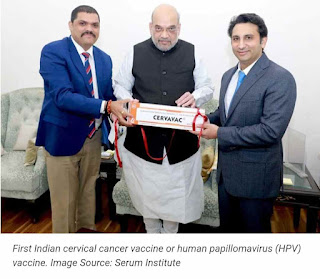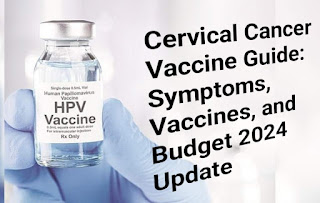Cervical Cancer Vaccine in India: Comprehensive Guide - Symptoms, Vaccines, and Budget 2024 Update
Cervical Cancer Vaccine Guide: Symptoms, Vaccines, and Budget 2024 Update
In the Interim Budget 2024, Union Finance Minister Nirmala Sitharaman shared plans to provide a cervical cancer vaccine for girls aged 9 to 14 in India. Additionally, she introduced other health initiatives, like extending Ayushman Bharat cover to Asha and Anganwadi workers.
Understanding Cervical Cancer: Causes and Risks in Simple Terms
Cervical cancer is a common type of cancer that affects the cervix, the lower part of the uterus, in women. It's often caused by a persistent infection with the human papillomavirus (HPV). In India, it's the second-most common cancer among women, contributing to a significant number of global cervical cancer deaths.
The cervix, which connects the uterus to the vagina, is where cervical cancer begins. This cancer typically progresses slowly, starting with changes in cervical cells called dysplasia. If left untreated, these abnormal cells can transform into cancer cells, growing and spreading into the cervix and nearby areas. This overview aims to simplify the understanding of cervical cancer, its causes, and risks.
In a significant move during Budget 2024, Finance Minister Nirmala Sitharaman emphasized the necessity of preventing cervical cancer in young girls. Addressing the nation, she announced a focused effort to encourage vaccination for girls in the age group of 9 to 14 years as a preventive measure against cervical cancer. This initiative aims to combat the second most common cancer diagnosed in women in India, shedding light on the importance of early preventive measures for a healthier future.
Cervical cancer, caused by the human papillomavirus (HPV), affects a considerable number of women in India. With the Budget 2024's special push for vaccination, it becomes crucial for parents and caregivers to understand the available HPV vaccines in the market. By prioritizing girls aged 9 to 14 for vaccination, the government aims to create awareness and take proactive steps in reducing the prevalence of cervical cancer, marking a significant stride toward public health enhancement.
Also read: Why mental is important?
Cervavac, developed in India, is a breakthrough HPV vaccine designed to prevent HPV infection and cervical or HPV cancer. It has undergone rigorous research, clinical trials, and regulatory approvals to ensure its safety and efficacy.
 |
| Cervical Cancer Vaccine Cervavac source: Serum Institute |
Efficacy and Safety of Cervavac Vaccine
Numerous clinical trials and studies have evaluated the effectiveness and safety of Cervavac. The cervical cancer vaccine has demonstrated high efficacy in preventing HPV infection, precancerous lesions, and cervical cancer. Clinical trials have shown that Cervavac provides robust defence against HPV types 16 and 18, which are responsible for around 70% of cervical cancer cases. Additionally, the cervical cancer vaccine offers cross-protection against several other high-risk HPV types, further reducing the risk of cervical cancer.
Cervavac: A Breakthrough Vaccine for Cervical Cancer Prevention
Cervavac, a revolutionary HPV vaccine developed in India, aims to protect against HPV infection and cervical cancer. This vaccine has undergone extensive research, clinical trials, and regulatory approvals to ensure it is both safe and effective.
The Efficacy and Safety of Cervavac
Numerous studies and clinical trials have examined how well Cervavac works and how safe it is. The vaccine has proven highly effective in preventing HPV infection, precancerous lesions, and cervical cancer. Clinical trials specifically highlight Cervavac's strong defense against HPV types 16 and 18, responsible for about 70% of cervical cancer cases. Moreover, this cervical cancer vaccine offers additional protection against various other high-risk HPV types, further reducing the overall risk of cervical cancer. Cervavac is a significant step forward in promoting women's health by providing a reliable shield against cervical cancer.
Ensuring Availability and Accessibility
Making Cervavac widely available in India is crucial in the fight against cervical cancer. The Government of India is taking steps to ensure that this vaccine is accessible to the population. It may be included in the national immunization program or introduced through specific vaccination campaigns targeting eligible age groups.
The Significance of HPV Vaccination
Vaccinating against HPV is a vital step in preventing cervical cancer. By vaccinating individuals before they come into contact with high-risk HPV types, we can significantly reduce the number of cervical cancer cases. The introduction of Cervavac in India is a major advancement in public health, offering a preventive measure that has the potential to save many lives.
Cervavac: A Milestone in Cervical Cancer Prevention
The introduction of Cervavac, India's first HPV vaccine, is a significant achievement in the battle against cervical cancer. This groundbreaking vaccine provides a powerful tool to prevent HPV infection and lessen the burden of cervical cancer in the country. With its high efficacy, safety, and accessibility, Cervavac has the potential to save countless lives and improve the overall health and well-being of individuals and communities.
Take Responsibility: Get Vaccinated
Remember, getting vaccinated is a personal and collective responsibility. By taking the initiative to get vaccinated with Cervavac, you not only protect yourself but also contribute to the health of the community. Consult your healthcare provider to learn more about Cervavac, its benefits, and the recommended vaccination schedule.
What's the Right Age for the Cervical Cancer Vaccine?
Answer: The HPV vaccine is suggested for routine vaccination when you're 11 or 12 years old. You can even start getting vaccinated at age 9. The Advisory Committee on Immunization Practices (ACIP) also recommends this vaccine for everyone up to 26 years old if they haven't had adequate vaccination earlier.
Can I Receive the HPV Vaccine at 30?
Answer: Generally, the HPV vaccine isn't recommended for those over 26 years old. However, if you're between 27 and 45 years old and haven't been vaccinated, you might consider it after discussing with your doctor. They can help you understand your risk for new HPV infections and the potential benefits of vaccination for you.
What Are the Signs and Symptoms of Cervical Cancer?
Answer: Look out for signs like vaginal bleeding after sex or menopause, pelvic pain, and pain during sex. However, these symptoms can also be due to other conditions, so it's advisable to seek an expert's opinion for confirmation.
How Is Cervical Cancer Diagnosed?
Answer: Diagnosing cervical cancer early can be challenging due to the absence of prominent symptoms. It often goes unnoticed, emphasizing the importance of regular check-ups and screenings.
What's the Cost of Cervical Cancer Vaccines?
Answer: The average cost for international vaccines ranges from INR 3000 to 10000 per dose. India's Serum Institute launched CERVAVAC, a made-in-India HPV vaccine, expected to cost below 500 INR for two doses.
At What Age Should the Cervical Cancer Vaccine Be Administered?
Answer: The first dose is recommended at 11-12 years or can start as early as 9 years, with the second dose given 6-12 months later. Girls aged 11-14 are ideal candidates, but it can be administered up to age 45 with reduced efficacy. Generally, it's not suitable after 26 years.
How Many Doses of the Cervical Cancer Vaccine Are Required?
Answer: For 11-12-year-olds, two doses are sufficient, while those aged 15-24 may need three doses. The CDC confirms that the two-dose schedule is effective for those under 15 years.
Why Is CERVAVAC Significant in the Fight Against Cervical Cancer?
Answer: CERVAVAC, India's first cervical cancer vaccine, offers hope by being cost-effective. In a developing country like India, affordability becomes crucial in the fight against the second-largest cancer in women.
What Are the Different Types of Cervical Cancer Vaccines in India?
Answer: India has two globally licensed vaccines – the quadrivalent vaccine (Gardasil™ by Merck) and the bivalent vaccine (Cervarix™ by Glaxo Smith Kline).
Disclaimer: The information provided here is purely general and aims to offer an overview of cervical cancer and its vaccine. Before initiating any treatment or medication, it is strongly advised to seek the guidance of a qualified medical professional.








0 Comments